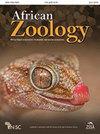南非夸祖鲁-纳塔尔省德班都市非本地玫瑰环长尾小鹦鹉的公民科学调查
IF 0.5
4区 生物学
Q4 ZOOLOGY
引用次数: 1
摘要
玫瑰环长尾小鹦鹉Psittacula krameri (Scopoli, 1769)已成为包括南非在内的几个国家的入侵物种,主要是通过宠物贸易释放和逃跑。我们对南非夸祖鲁-纳塔尔省德班市德班市的居民进行了一项在线问卷调查。我们的目的是确定玫瑰环长尾小鹦鹉的分布、栖息地和饮食。我们还确定了公众是否认为长尾小鹦鹉是有害生物,以及是否支持控制措施。我们发现在德班北部有许多长尾小鹦鹉的目击报告,主要是在购物中心及其周围。大约64.5%的答复者为长尾小鹦鹉提供了饲养站,其中大多数提供种子和谷物。共有173名(55.4%)受访者认为长尾小鹦鹉是有害生物。据报道,玫瑰环长尾小鹦鹉追逐9种鸟类,其中7种是本地鸟类,2种是非本地鸟类。大多数受访者认为不应该控制长尾小鹦鹉。然而,大多数支持控制鸡蛋的人建议射杀并销毁鸡蛋。我们的结论是,长尾小鹦鹉的分布可能正在扩大,并与该城市景观中的人为活动有关。然而,公众的看法可能会使入侵的玫瑰环长尾小鹦鹉管理困难。本文章由计算机程序翻译,如有差异,请以英文原文为准。
Citizen Science Survey of Non-Native Rose-Ringed Parakeets Psittacula krameri in the Durban Metropole, KwaZulu-Natal, South Africa
The Rose-ringed Parakeet Psittacula krameri (Scopoli, 1769) has become invasive in several countries, including South Africa, mainly through the pet trade releases and escapees. We conducted an online questionnaire survey targeting the residents in Durban, eThekwini Municipality, KwaZulu-Natal, South Africa. We aimed to determine the distribution, habitat and diet of the Rose-ringed Parakeet. We also determined if the public perceived parakeets as pests and if control measures were supported. We found that many parakeet sightings were reported in Durban North, primarily in and around shopping centres. Approximately 64.5% of respondents provided feeding stations for parakeets, with most providing seeds and grains. A total of 173 (55.4%) respondents considered parakeets as a pest. Rose-ringed parakeets were reported to chase nine bird species, of which seven were native and two non-natives. Most respondents stated that parakeets should not be controlled. However, most of those who supported their control suggested shooting and destruction of eggs. We concluded that the distribution of parakeets is likely expanding and associated with anthropogenic activities in this urban landscape. However, public perceptions may make invasive Rose-ringed Parakeet management difficult.
求助全文
通过发布文献求助,成功后即可免费获取论文全文。
去求助
来源期刊

African Zoology
生物-动物学
CiteScore
2.60
自引率
9.10%
发文量
18
审稿时长
>12 weeks
期刊介绍:
African Zoology , a peer-reviewed research journal, publishes original scientific contributions and critical reviews that focus principally on African fauna in terrestrial, freshwater, and marine ecosystems. Research from other regions that advances practical and theoretical aspects of zoology will be considered. Rigorous question-driven research in all aspects of zoology will take precedence over descriptive research. The Journal publishes full-length papers, critical reviews, short communications, letters to the editors as well as book reviews. Contributions based on purely observational, descriptive or anecdotal data will not be considered.
The Journal is produced by NISC in association with the Zoological Society of South Africa (ZSSA). Acceptance of papers is the responsibility of the Editors-in-Chief in consultation with the Editors and members of the Editorial Advisory Board. All views expressed are those of the author and not necessarily those of the Editors or the Department.
 求助内容:
求助内容: 应助结果提醒方式:
应助结果提醒方式:


